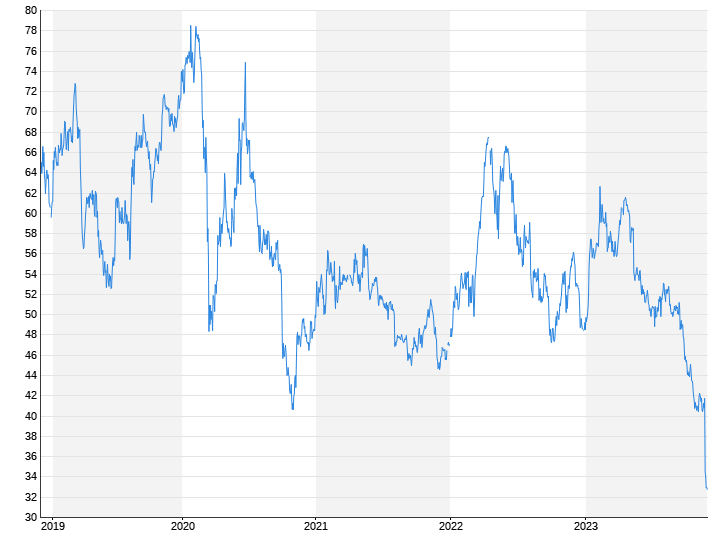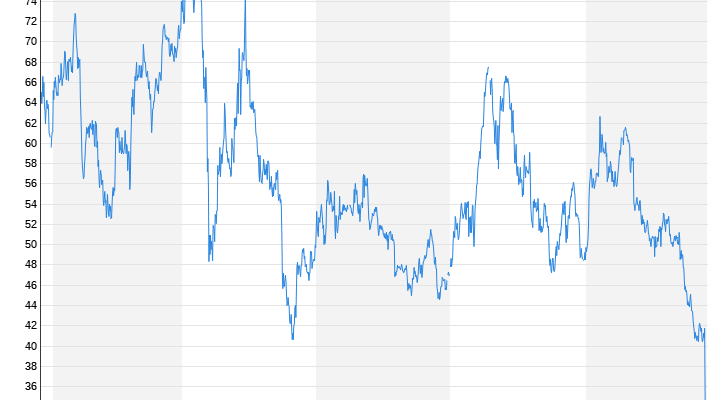Things are getting tough for Bayer: the outlook is bleak, debts are high, and the pharmaceutical division is weakening. There are also legal hassles. The share price is plummeting. CEO Bill Anderson has little alternative but to split up the company.
Anyone who finds their way to the investor pages on Bayer’s homepage will be greeted by the words “Creating value for our shareholders.” But the pharmaceutical and agricultural group is currently a long way from that: Since the beginning of the week, the Leverkusen-based company has destroyed almost 8 billion euros in market value, and its shares have fallen by around 20 percent. This had never happened before in the company’s history. And that now requires radical changes.

The drama was triggered by a whole series of bad news: The streak of bad luck started on Friday when the Leverkusen-based conglomerate had to recall a batch of its cancer drug Vitrakvi because impurities had been found during routine tests. A blessing in disguise: the medicines had not yet been administered.
On the same day, a court in the US state of Missouri ordered Bayer to pay a fine of $1.5 billion. The judges held Bayer responsible for the cancers of three farmers who had used Bayer subsidiary Monsanto’s weed killer “Roundup” containing glyphosate.
The third low blow followed on Monday: Bayer had to stop the costly development of the blood thinner Asundexian in phase three, i.e. at an advanced stage, due to poor effectiveness. With more than 30,000 participants in 40 countries, the clinical trial was one of the largest that Bayer had ever undertaken. The company had hoped to generate sales of up to 5 billion euros from the drug for patients at risk of stroke. And the patents for Asundexian’s precursor Xarelto, from which Bayer has already earned 3 billion euros this year, will soon expire. Then other manufacturers are likely to imitate the product and Bayer’s share of sales will dwindle.
Expensive lawsuits
The Bayer subsidiary Monsanto also found itself in further trouble at the start of the week: In Seattle, six teachers and a janitor sued because the chemical PCB manufactured by Monsanto, which is used in building materials, had caused them cancer, brain damage and other health problems should. The jury found that the company was responsible and ordered Monsanto to pay $165 million. Further payments in the hundreds of millions could follow.
It may be a coincidence that the most recent low blows fell on Bayer almost at the same time. But they have a long history, dating back to what some investors have called “the biggest management mistake in history.” In 2018, Bayer acquired US competitor Monsanto for a horrendous 63 billion euros. That was at the limit of what was affordable at the time and Bayer went into massive debt to be able to manage the takeover. The then CEO Werner Baumann believed that he had saved Bayer from being taken over by Monsanto. Since then, Bayer has consisted of three divisions: Pharma, Crop Science (agricultural business) and Consumer Health (non-prescription medicines).
Shortly after the Monsanto takeover, however, tens of thousands of users of Monsanto’s “Roundup” product initiated an enormous wave of lawsuits in the USA. Baumann had actually hoped for protection from the US Department of Justice, but they stayed out of it. They didn’t want to mess up with so many voters. Bayer lost one lawsuit after another and had to pay huge amounts of damages: the company has already paid some $16 billion or set aside for penalties.
The high level of debt, coupled with the never-ending lawsuits in the USA, has driven away more and more investors. At the time of the Monsanto deal, the share price was around 100 euros. In the past six years it has fallen to under 33 euros.
Hopeful under pressure
Such a scenario calls activist investors onto the scene: At the beginning of the year, Bluebell Capital from London bought into the DAX company and advocated to the other investors that Bayer spin off the high-growth consumer health segment with non-prescription drugs such as aspirin and thus to reduce the mountain of debt of around 36 billion euros. This mountain of debt further clouds Bayer’s prospects in an environment of rising interest rates. US investor Inclusive Capital also got involved and joined forces with Bluebell.
Shareholder Union Investment is also there: “The most sensible thing would be to separate from Consumer Health as part of a spin-off,” says portfolio manager Markus Manns when asked by “Capital”. The company would be valued higher on the stock exchange than within the group.
The owners can count it as a partial success that Baumann resigned in February. His successor Bill Anderson, who had previously initiated comprehensive changes as head of pharmaceuticals at the Swiss company Roche, was seen as the new beacon of hope at the time. Today he is under pressure.
Because it’s about much more than just the legacy issues. The outlook for the coming year is cautious: “In the Crop Science sector, there is likely to be headwind due to, among other things, lower corn cultivation areas and price pressure for crop protection, while the pharmaceutical business is likely to continue to be under price and reimbursement pressure,” writes Deutsche Bank analyst Falko Friedrichs. He also expects high cost pressure and a decline in profits in 2024.
“Poisonous cocktail”
Actually, Anderson no longer has a choice. He has to announce the split if he wants to save the share price. And he wouldn’t be the first pharmaceutical CEO to take this step: Johnson & Johnson has already taken its consumer health division Kenvue public, Sanofi is preparing a spin-off, and Glaxo and Pfizer have their joint consumer health company , Haleon, spun off.
However, analyst Friedrichs assumes that it will be a while before Anderson announces the potentially saving step. “Therefore, the operationally difficult prospects for 2024 continue to be in the foreground.”
But that doesn’t mean investors have to sell now. Some banks, including Deutsche Bank, have downgraded the share. But no one advises selling. Because as Manns from Union Investment says: “The toxic cocktail of high interest rates, glyphosate lawsuits and now weaknesses in the pharmaceutical division is not a threat to the company’s existence.” In an emergency, Bayer could also cut its dividend or raise fresh capital on the stock exchange. It is important that Anderson’s strategy is clearly structured in terms of content. In the meantime, what is required is patience and strong nerves. Because if Anderson can withstand the pressure from the capital market, he will only announce his new strategy as planned at the Capital Markets Day in March 2024.
